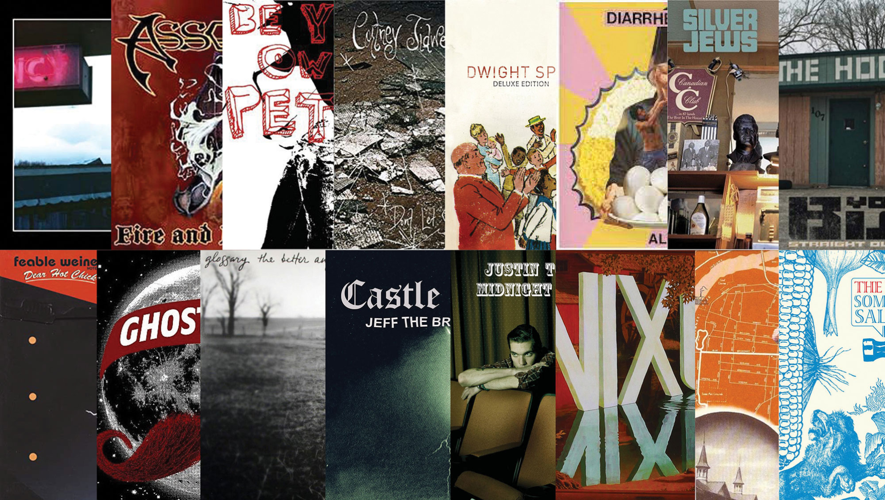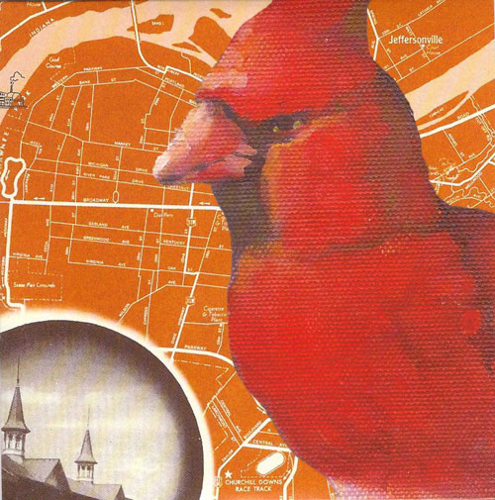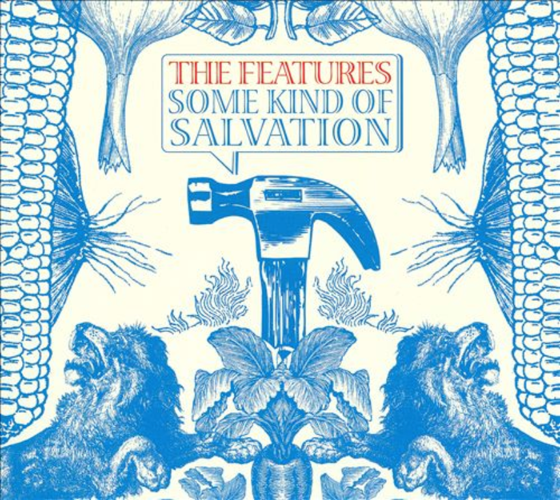
Editor’s note: In an occasional series called Through Lines, we’re taking a look back at records that help tell the evolving story of Nashville music, one decade at a time. Our installment on the 2000s comes to us from former Scene music editor Tracy Moore, who called on a variety of contributing writers to discuss a wide range of releases from the decade. Also see our installments on the 1970s, the 1980s and the 1990s.
Nashville music fans faced an increasingly frustrating problem in the Aughts: deciding which of many exciting local independent acts — often as not, very new ones — to check out on a given night. By mid-decade, the issue grew more serious, with a slew of top-notch recordings to match those thrilling live shows, and national attention turning our way. Though the era saw many artists wrestle deeply and sometimes publicly with notions of “selling out” — remember when that was still a sick burn, kids? — the crowded scene meant more competition. It produced a high caliber of work that channeled the city’s history and roots, and forged ahead in directions no one expected from a place still primarily known for hawking country.
Though it certainly wasn’t the first time the city would prove it had more to offer than steel guitars and sob stories, what it meant to be “a Nashville band” drastically expanded in the 2000s. Silver Jews moved to town. Kings of Leon made Nashville their chosen home. Young Buck emerged from the hip-hop underground. Emo pop-punkers Paramore broke the so-called Nashville Curse — that is, the belief that a non-country band couldn’t have a platinum-selling record. Jack White ditched Detroit for Music City, and Akron’s The Black Keys were soon to follow. Major labels took an interest in slickening up homegrown sounds from bands like The Pink Spiders. All the while, all corners of the city’s underground pumped out persistent greatness, from the manic jolt of The Privates to the jangle punk of MEEMAW and beyond. In some cases, previous efforts were bearing fruit, like when rock raconteur Dave Cloud and idiosyncratic megaband Lambchop began to build significant audiences overseas. For others, like Those Darlins, the groundwork was being laid for breakthroughs in the 2010s. We at the Scene launched our very own music blog, Nashville Cream, in 2006. It became the place to hash it all out, proving just how much there was to debate.
Regardless of which bands you were rooting for, Nashville’s non-country music scene would never be the same again. So revisit the scrappy hustle of the era in this admittedly imperfect selection of records — not even considering singles! It’s the result of a process more agonizing than deciding whether to hit up The Basement, The 5 Spot or Mercy Lounge on any given night in 2008. We usually did all three, anyway. TRACY MOORE
Lambchop, Nixon (Merge, 2000)
Lambchop’s three-plus decades of slow evolution aren’t neatly divided, but Nixon remains a landmark. Earlier records like 1997’s Thriller showcased the Nashville institution’s shift toward the format of a big cast of players making mellow, sidelong examinations of American culture and ’70s R&B, disco, countrypolitan and lots more, in an ever-widening orbit around singer-songwriter Kurt Wagner. Later releases like 2004’s double LP Awcmon/Noyoucmon or 2016’s electronically enhanced FLOTUS might seem more adventurous. But Nixon still feels like the place to start when giving someone a frame of reference for Lambchop. STEPHEN TRAGESER
Count Bass D, Dwight Spitz (Day By Day, 2002)
Count Bass D challenged rap’s orthodoxy on his early studio records long before today’s emo rappers warbled over dime-store beats. Yet that risk-taking resulted in Sony dropping him from his record deal in the late ’90s. On Dwight Spitz, the “Fender Rhodes Scholar” returned from exile a self-made master of contemporary production hardware like the Akai MPC, employing the same clever rhyme couplets and musicality that had record execs drooling years before — only he delivered the sweetness in a more traditional hip-hop format. Contributions from the late MF DOOM put shine on a masterpiece that began a glut of material from the MTSU graduate during the decade. MARK MAYS
Feable Weiner, Dear Hot Chick (Doghouse Records, 2002)
Feable Weiner was a mesmerizingly tight bunch of hammy, bow-tie-wearing showmen. They channeled the pinball energy and slick harmonies of their live show into Dear Hot Chick, a scorching power-pop-punk sugar bomb of super-sized hooks, soaring choruses and amusingly juvenile declarations of teenage lust — all packaged in a CD-size Trapper Keeper. Most of all, they made it all look like an easy, good-natured goof. It got the attention of not just the industry but musical mastermind Matt Mahaffey, who produced the band’s 2008 followup 2FN HOT. He also encouraged them to change their name, which became Mondo Primo; in a recent email, Mahaffey says he regrets the advice. “A super talented bunch of guys who would be big rockstars right now if they hadn’t met me,” he writes. But we know better: The music biz is a fickle mistress, and we chalk it up to another mystery of the pop universe that the Weiner didn’t, ahem, instantly release its load on arrival. And given today’s nostalgic affection for second-wave pop punk, it still just might. TRACY MOORE
Asschapel, Fire and Destruction (Crimes Against Humanity, 2003)
While the hard and heavy side of Music City gained notoriety in the 2010s, that was far from the case in the 2000s. In those days, touring metal and hardcore bands routinely left Nashville off their itineraries. The ace up our sleeve, though, was Asschapel. The name was unforgettable, and so were the shows — a furious melee of limbs, sweat and spit. Fire and Destruction is the definitive document of that time, capturing the Chapel’s crossover thrash at the height of its power. The band broke up three years later, but influential metal label Southern Lord took up the cause, compiling the band’s entire catalog on 2016’s Total Destruction. MATT SULLIVAN

Young Buck in 2010
Young Buck, Straight Outta Cashville (G-Unit/Interscope, 2004)
With the production arsenal of 50 Cent’s G-Unit behind him, Young Buck’s Straight Outta Cashville put Nashville’s rap scene on the national stage. The release gave voice to the people of what were then thought to be ungentrifiable areas of the North Side — as in “Dodge City,” where Buck comes from. Beats from Sha Money XL, Lil Jon and Three 6 Mafia backed up Buck’s voice with rattle-the-speakers-in-your-Escalade booming bass, powering the record beyond late-stage crunk mediocrity. We wanted more of a specific Nashville flair and less of a general Dirty South, but the record topped charts upon its release all the same. MARK MAYS
Ghostfinger, These Colors Run (Set International, 2005)
Ghostfinger’s These Colors Run is a refutation of American jingoism in the early years of The Endless Wars. It is a celebration of rock music’s silliest motivations and a sweaty proclamation of its potential for salvation. It is the sweaty headband of Nashville Aughts rock. These Colors Run connected Murfreesboro’s house-party circuit to the tobacco-stained wood paneling of Springwater to the nascent East Nashville scene — a feat at the dawn of social networking. The album combines the devil-may-care attitude of the underground with a chops-over-everything ethos that made Music Row famous, walking the genius/goofball line with the genuine swagger that comes from keeping your tongue planted firmly in your cheek. SEAN L. MALONEY
Silver Jews, Tanglewood Numbers (Drag City, 2005)
At this point, the degree to which David Berman labored over his words is well documented. The execution made it seem effortless, and the ramshackle sound of Silver Jews gave everything an air of spontaneity. That looseness largely disappeared on Tanglewood Numbers. Here, the Jews sound powerful and precise, while Berman is by turns playful, confident, confessional, insightful, hilarious and heartbreaking. It’s a record that’s inseparable from the Tennessee I knew at the time. “Punks in the Beerlight” will always remind me of Springwater. On “Sleeping Is the Only Love,” Berman name-drops my tiny hometown. Sixteen years later, I still quote this album on the regular, and I’ll always love it to the max. MATT SULLIVAN
JEFF the Brotherhood, Castle Storm (Infinity Cat, 2006)
Back in the mid-Aughts, brothers Jake and Jamin Orrall’s JEFF the Brotherhood — also at the time in a band called The Sex, and briefly known as just JEFF — were the hottest ticket in town. The duo’s weird, fun amalgam of Sabbath-tone metal and goofball pop punk went off like a goddamn cherry bomb at shows, and perhaps the best they ever did in terms of capturing their lightning-in-a-bottle live presence on record was Castle Storm. The songs’ subject matter wasn’t important — sharing a continental breakfast, playing drums, whatever the hell the 22-second “Tasty Breez” is about. But the Orrall brothers’ chemistry and powerful irreverent energy was there in spades, and it was glorious. D. PATRICK RODGERS

Be Your Own Pet, Be Your Own Pet (Ecstatic Peace, 2006)
Listening to Be Your Own Pet’s self-titled album makes me feel old. But it also made me feel old way back in 2006 when I was only five or so years older than the teenage foursome. This record is a distillation of youth, all staccato energy and sneer. Frontwoman Jemina Pearl got (and deserved) the lion’s share of the attention — though it’s also worth taking a minute to consider some of the other reasons the petite blonde with the primal shriek might have caught the press’s eye. But listening back to the album now, it’s Jamin Orrall’s emphatic drumming that wows. His hefty hits are the backbone of this thrilling debut. LEE STABERT

Lone Official, Tuckassee Take (Honest Jon’s Records, 2006)
Thanks to supple, interwoven guitar parts and the clever lyrics of frontman Matt Button, locals Lone Official in their heyday fetched frequent comparisons to indie-rock royalty Pavement. But with 2006’s Tuckassee Take, the five-piece issued something entirely singular — a 14-track collection of songs about horse racing and bar fights and Amelia Earhart, as brainy and unique as they are silly and fun. Fifteen years after Tuckassee’s release, the nimble riff of “Le Coq Sportif” and the genius opening couplet of “Fight Song” (“To win in a bar fight in Tennessee, you must be proficient left-handedly”) still bounce around frequently in my head. D. PATRICK RODGERS

Cortney Tidwell, Don’t Let Stars Keep Us Tangled Up (Ever, 2006)
Lush and transporting, Cortney Tidwell’s debut long-player sounds as fresh and unencumbered by notions of what music from Nashville should be as it did upon release. With an approach that is at once exacting and experimental, and with contributions from Lambchop’s Kurt Wagner among other familiar Nashville names, Tidwell brings to mind a folk singer beaming messages from the future, her strong plaintive vocals dipping and soaring above moody, pulsing beds of drums, keyboard and guitar. Her follow-up Boys was even more expansive — further proof, if we ever needed it, that growing up in the shadow of the Opry needn’t mean getting stranded there. STEVE HARUCH
Glossary, The Better Angels of Our Nature (self-released, 2007)
Glossary’s fifth album was released as a free download a few months after their “10-Year Bandiversary” show at Murfreesboro’s The Boro Bar and Grille. I don’t think I’m alone in saying it’s felt like a hand on my shoulder ever since. It’s a smoldering, snarling roots-schooled rock record with smart and poignant songs about the courage it takes to grow up, especially while wrestling with the uneasy legacy of the South. STEPHEN TRAGESER
Altered Statesman, Altered Statesman (self-released, 2008)
Altered Statesman leader Steve Poulton proved himself a master of the urban picaresque on the band’s self-titled 2008 album. Altered Statesman brilliantly updates 1960s Chicago soul, and Poulton’s voice curls around his songs like smoke rings. Still, the world he describes includes crime, heartbreak and dislocation. In “C Cruise,” Poulton mentions New Orleans rock ’n’ roller Huey “Piano” Smith, while “The Ghost of Charlie Feathers” describes a universe where the anarchic spirit of the famed rockabilly singer lives on forever. Altered Statesman benefits from playing by Nashville notables like Lambchop pianist Tony Crow and bassist David Jacques. Poulton gets to the emotional heart of every song, but Altered Statesman — like the band’s 2019 release Tried as Adults — never loses its cool. EDD HURT

The Features, Some Kind of Salvation (self-released, 2008)
The hard-luck history of Tennessee power pop wouldn’t be shit without The Features. Unfortunately, much of the outside world — save for those who didn’t skip the opener at scores of career-peak Kings of Leon concerts, or Shazam “This Disorder” while taking in a 2013 Ford Mustang commercial — still doesn’t know that. And most who do, don’t know that Exhibit A, the group’s dizzying 2004 major label debut, isn’t really the band’s finest record. That is Some Kind of Salvation. After the band was processed through the majors’ wood chipper of dreams, this album was released independently in 2008 and by KoL’s Serpents and Snakes imprint the following year. Salvation delivers signature hard-rockin’ hook blitzes of careening guitar-and-organ-driven cuts like “The Drawing Board” and “Lions.” But those are tempered with newfound depth and subtlety on patient, addictive slow-burners like the baroque-pop shuffle “Baby’s Hammer” and New Wave-y near-masterpiece “Concrete.” ADAM GOLD
Justin Townes Earle, Midnight at the Movies (Bloodshot, 2009)
Circa 2010, Justin Townes Earle’s breakthrough Harlem River Blues would make the Music City native a favorite of audiences far and wide. But his transitional 2009 album Midnight at the Movies exudes a relaxed confidence and controlled charisma that are missing from his 2008 debut full-length The Good Life. With themes of dark nostalgia explored through traditions of prewar folk and blues with golden-era country sheen, Midnight plays like a collection of standards from an alternate timeline that ache effortlessly. On Midnight, you can hear Earle, who was only 38 when he died in 2020, holding tight to his roots even as he’s transcending them. SETH GRAVES
Diarrhea Planet, Aloha (self-released, 2009)
For better or for worse, Aloha, Diarrhea Planet’s sub-10-minute debut, will always be known as “that record with ‘Ghost With a Boner’ on it.” But it’s also so much more than that. Aloha is the purest distillation of what drew people to DP and a window into what local punk would sound like in the next decade. It’s a ramshackle party, an earnest fist in the air, a cathartic scrum of gang vocals and guitars. Though the outsized noodling guitar solos wouldn’t come until Loose Jewels in 2011, Aloha has all the heart and joy of a DP show in a compact package. LANCE CONZETT










